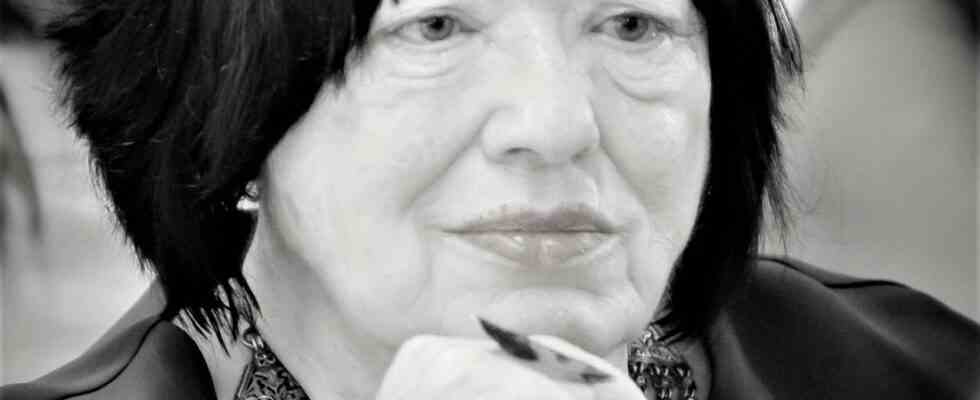Anke Roeder could hardly be overlooked in Munich theater life. Not working as an actress herself, but as a theater scholar, dramaturge and professional spectator, she looked like a diva. Pitch black hair, bright red lipstick, always special clothes and bling. Not fashionable, but: sophisticated. Kind of post art nouveau. As if she had stepped out of a Gustav Klimt painting. She would never try to quit smoking. Roeder smoked with elegance and passion, and you could drink and discuss with her late into the night. Although, it was a quirk of hers, she tongued her tongue coquettishly when she spoke and liked to let her hair fall over her face theatrically like a curtain – in order not to deviate an iota from her opinion, intellectually demanding and incorruptible as she was.
Whether after chamber play premieres in the Blaues Haus, in the Resi or at the “Radikal Jung” festival in the Volkstheater – delving into the specifics of a production or the development of the theater in general with Anke Roeder could become intense, take a long time and also be exhausting . But in these hours the theater was always the most important thing and Roeder his most passionate apologist, she burned and she lived for it. Unfortunately, at a time when both the chairs and the dramaturgy were still firmly in the hands of men and a flamboyant exotic and freethinker like her, despite all her knowledge and erudition, was viewed somewhat askance.
Until not so long ago, German dramaturgs and university professors had to be mousy, adjusted and withdrawn, if at work. But Anke Roeder, born on July 26, 1939 in Hamburg, was feminine, sensual and challenging, also a bit chaotic, spoke associatively and enthusiastically about the pleasures of life – and seemed to fit better in the Parisian salons of the 1920s than in the back room a German municipal theater or a university seminar, even though she wanted to go there and make a difference.
She studied literature, philosophy and English in Munich, Berlin and London and did her doctorate at the Ludwig-Maximilians-Universität (LMU). She then worked as a dramaturge at the Deutsches Schauspielhaus in Hamburg, at the theaters in Kiel and Dortmund and at the Munich Residenztheater; has also worked as a lecturer in London and Munich. From 1995 to 1999 she held a professorship for dramaturgy at the University of Music and Theater in Leipzig and was then head of the dramaturgy course at the Bavarian Theater Academy August Everding until 2003. But she did not get a professorship there, not even at the LMU, where she was also a lecturer.
She taught and promoted contemporary drama, especially that of women
Roeder was a profound connoisseur of (post)modern drama and open to everything new. In the seminars she gave, she sat at the front of the desk, smoked, philosophized, digressed and stimulated. She introduced her listeners to French poststructuralism and postmodernism – her passion – and introduced them to contemporary drama, especially that of women. Gerlind Reinshagen, Erika Junge, Elfriede Jelinek, Gisela von Wysocki, the young Kerstin Specht – it was Anke Roeder who introduced these authors, stood up for them and wrote about them. For her, theory always went hand in hand with practice. By helping to set up the first Jelinek project in Munich in around 1996 in the Marstall under the direction of Elisabeth Schweeger (with Hanna Schygulla as the actress). Or introduced the invited directors in the early days of “Radikal Jung” (also in book form). And anyway: by always dragging her students to the theater and forcing them into discourses. Roeder’s publications include the “Art of Dramaturgy” (2011), edited together with Klaus Zehelein. That was what she was: an artist of dramaturgy. As has now become known, Anke Roeder died in Munich on September 8th. She was 83 years old.
Condolence possible below www.sz-gedenden.de

